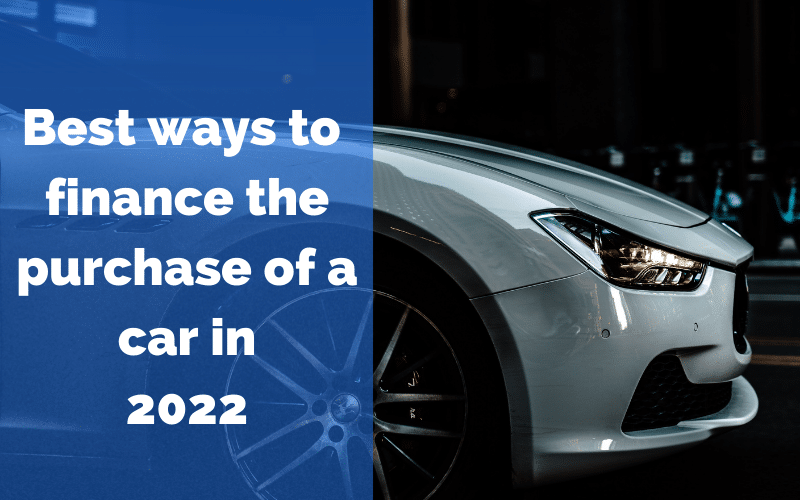Best Way To Finance A Car Purchase (2022)
The purchase of a new or used car can be an exciting event, but financing the purchase is usually not enjoyable. There are many options for financing available today, and each option comes with its own pro’s and con’s.
The choice you make will directly impact your ability to manage your finances. It’s vital to understand what you’ll gain or lose by choosing different financing methods before you even start shopping around for cars.
The information contained in this article should serve as a general guideline for your decision-making process. Don’t forget to consider other factors specific to your situation before deciding how to finance your next car.
Here are some things you need to know:
Table of Contents
Best time to buy a car
It may seem like there is no such thing as the wrong time to buy a car, but this is not always true. The best times to purchase your next vehicle are during the “off-season” – when new models have recently arrived on dealer lots and used car supplies are at their greatest.
Prices of older models will be more affordable during these months because demand has decreased since the arrival of the newer models.
Downpayment
The larger the down payment you make, the better terms you’ll receive from your lender or finance company. You can even use some of your savings for more money down.
This amount will lower your monthly payments by spreading out the cost of borrowing over a more extended time. Plus, it shows that you’re financially responsible by having saved up for this purchase until now.
However, if you can’t afford to make a larger down payment, don’t despair. You’ll still be able to get approved for financing – but your monthly payments will probably be higher because of the increased risk associated with lending to poor credit customers.
Contract
You should always review your entire contract before signing it. Be sure about all fees and interest rates, so there aren’t any surprises after making the purchase. Don’t sign anything until you understand precisely what it entails!
What are the typical arrangements offered by lenders?
NON-REVOLVING LOANS: Based on installment payments with fixed amounts and specific repayment periods (e.g., 3-year loan repayments).
REVOLVING LINES OF CREDIT: Based on a limit of the amount, you can withdraw from your credit account and repay in full within a specific time frame (e.g., a credit card).
OPEN-END LOANS: Usually, variable interest rates may be tied to an external index like LIBOR, prime, or federal funds rate. You will have a fixed repayment period, and the lender will not assign an annual percentage rate for this type of loan.
Your APR Is Based On Many FACTORS, INCLUDING:
- Your income.
- The cost of the vehicle you want to purchase.
- Your employment status.
If you have good credit, your rates will most likely be lower than someone with poor credit. If you have excellent credit, then your rates will be even lower than that!
Quite a few other factors influence the interest rate on your loan agreement, too (like if there’s an early payoff penalty clause written in). But if you can afford to make pretty high monthly payments without stretching yourself thin financially, this is one of the best ways to finance your next car purchase.
What about buying or leasing?
Leasing offers lower monthly payments when compared to financing because you’re not paying for an entire year’s worth of use upfront like when buying. However, at the end of this time frame, you’ll probably pay more money in fees and taxes would be needed to buy the same car.
Buying a car is more cost-effective in the long run because you won’t have to make your payments for as many years as you would if you were leased. This also allows you to drive a more excellent, newer vehicle every couple of years instead of driving used cars for eternity!
New model year cars are currently selling at their highest prices ever. That’s why it’s best not to finance or buy them before the end of the year – if you can wait that long anyway!
Consumers can expect all price tags on new current vehicles to remain high until the following year arrives and brand-new models become available. Even then, dealerships may still charge customers a premium to make a more significant profit.
What about dealer financing?
According to loan matching service UPMoney.co.uk his might be your only option if you have bad credit or no credit since most dealerships won’t provide financing without a down payment. Plan on making a larger down payment if you choose to go with dealer financing because this type of loan also has higher interest rates and fees associated with it when compared to other forms of auto financing.
Despite high prices for new vehicles, consumers desire to buy – especially if they can finance at low rates. But price growth is outpacing income growth, so affordability is becoming an issue for buyers.
Average interest rates for new auto financing are higher than any other type of financing, including credit cards and mortgages! Interest rates for cars can range anywhere from 2-8%, while mortgages may cost between 3.2%-4.5%.
Be sure to consider the following information when financing a car:
- If you have an excellent credit score, your APR is likely lower than someone with poor credit. Average APRs on new current vehicles are hovering around 5% right now, but they’re expected to rise the next following year.
- You should never finance a vehicle without knowing its exact price tag. Most people base their monthly payments on the amount they have available for their down payment and trade-in, but this is a big mistake. Different lenders charge different fees. Even if you have $5,000 for your down payment and trade-in, some lenders may only give you credit for around half of that amount!
• It’s also important to know the actual MSRP (manufacturer suggested retail price) of the vehicle you want before buying or leasing it. If you don’t, dealerships can charge whatever they feel like because car shoppers rarely know how much a new model should cost. As a result, many people end up paying hundreds more than they wanted to pay – which is why it’s vital to calculate all costs associated with financing before going shopping for a new auto loan.
How do I pay off my car loan?
Once you finally take possession of your vehicle, don’t forget to start making your monthly payments. If you only make the minimum amount due, you’re going to pay more for it in the long run because interest will keep adding up!
You can always pay extra whenever possible but at least try to make your regular payment every time. By doing this, lenders are usually willing to lower your APR, which means less money wasted on costly interest fees.
Don’t forget about other things either! Fees are important when figuring out what type of financing you should go with because most loans like personal loans or car loans have a fee associated with them.
Common items that may require additional fees include:
- A maintenance plan.
- Extended warranties.
- GAP insurance.
In short, you should always do as much research as possible before deciding on a particular form of auto financing. If you’re not careful, you’ll pay too much or take on more debt than you can handle.
Take all steps necessary to reduce your interest rate and fees. This means shopping around for the best deal on a vehicle and finding out how much money lenders will charge for an auto loan beforehand!


